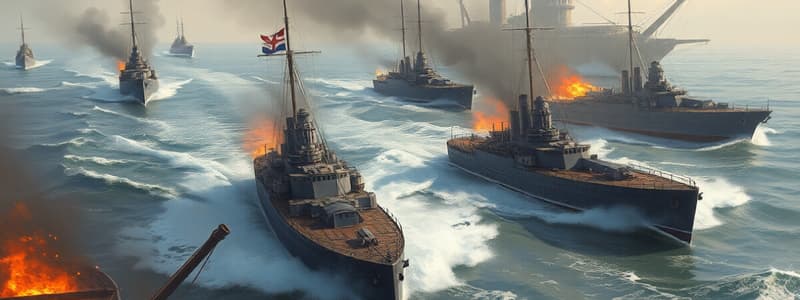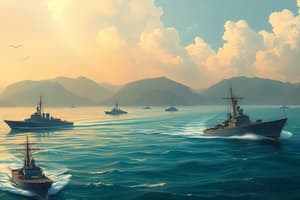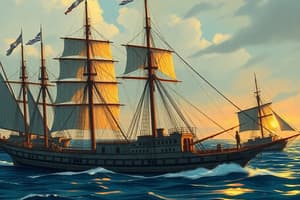Podcast
Questions and Answers
Which country had the larger number of dreadnoughts in 1914?
Which country had the larger number of dreadnoughts in 1914?
- Italy
- Germany
- France
- Britain (correct)
Germany had a long naval tradition that surpassed Britain's naval capabilities.
Germany had a long naval tradition that surpassed Britain's naval capabilities.
False (B)
Name one key advantage that the British Navy had over the German Navy.
Name one key advantage that the British Navy had over the German Navy.
Larger fleet
The German ships were of superior design, particularly in the quality of their __________.
The German ships were of superior design, particularly in the quality of their __________.
Match the following types of warships to their descriptions:
Match the following types of warships to their descriptions:
What was one consequence of Britain declaring the North Sea a war zone?
What was one consequence of Britain declaring the North Sea a war zone?
Give two reasons why Germany was a threat to Britain at sea.
Give two reasons why Germany was a threat to Britain at sea.
The German High Seas Fleet actively engaged British ships right from the beginning of the war.
The German High Seas Fleet actively engaged British ships right from the beginning of the war.
What does Source B claim about the German fleet's performance at the Battle of Jutland?
What does Source B claim about the German fleet's performance at the Battle of Jutland?
Both sources agree that the German fleet avoided a prolonged battle.
Both sources agree that the German fleet avoided a prolonged battle.
What did Source A note about the British losses during the battle?
What did Source A note about the British losses during the battle?
Source A suggests that the Germans fled when the British ____ forces joined.
Source A suggests that the Germans fled when the British ____ forces joined.
Match the following statements to their corresponding sources:
Match the following statements to their corresponding sources:
What does Source A imply about the German fleet's strategy during the battle?
What does Source A imply about the German fleet's strategy during the battle?
Both sources agree that the British had a larger number of ships.
Both sources agree that the British had a larger number of ships.
According to Source B, how did the British fleet respond when the German main forces appeared?
According to Source B, how did the British fleet respond when the German main forces appeared?
What was the change in German U-boat policy in February 1915?
What was the change in German U-boat policy in February 1915?
The Lusitania was only used as a passenger ship during its voyages.
The Lusitania was only used as a passenger ship during its voyages.
What was the primary reason both sides were cautious with their navies?
What was the primary reason both sides were cautious with their navies?
How many Americans drowned when the Lusitania sank?
How many Americans drowned when the Lusitania sank?
The British Navy faced heavy losses during the Battle of Heligoland Bight.
The British Navy faced heavy losses during the Battle of Heligoland Bight.
The German government claimed the Lusitania was carrying ______ supplies.
The German government claimed the Lusitania was carrying ______ supplies.
What was the date of the Battle of Heligoland Bight?
What was the date of the Battle of Heligoland Bight?
Match the following events with their descriptions:
Match the following events with their descriptions:
During the Battle of Heligoland Bight, the German navy lost ___ light cruisers and ___ destroyer.
During the Battle of Heligoland Bight, the German navy lost ___ light cruisers and ___ destroyer.
What was one major consequence of the German U-boat policy?
What was one major consequence of the German U-boat policy?
Match the following events with their outcomes:
Match the following events with their outcomes:
The warning placed by the German Embassy in Washington D.C. was widely heeded by travelers.
The warning placed by the German Embassy in Washington D.C. was widely heeded by travelers.
What was the main concern for Germany after the sinking of the Lusitania?
What was the main concern for Germany after the sinking of the Lusitania?
What was one of the key objectives of the German raids on Scarborough, Whitby and Hartlepool?
What was one of the key objectives of the German raids on Scarborough, Whitby and Hartlepool?
Admiral Jellicoe believed the British Navy could lose the war in a single day if destroyed.
Admiral Jellicoe believed the British Navy could lose the war in a single day if destroyed.
How many German sailors died during the Battle of Heligoland Bight?
How many German sailors died during the Battle of Heligoland Bight?
What did the author imply about the German fleet after the battle?
What did the author imply about the German fleet after the battle?
The British navy was significantly smaller than the German navy during the Battle of Jutland.
The British navy was significantly smaller than the German navy during the Battle of Jutland.
What tactics did the British use to protect their shipping from the U-Boat threat?
What tactics did the British use to protect their shipping from the U-Boat threat?
The phrase 'enemy losses are several times greater' implies that the British suffered ______ losses at the Battle of Jutland.
The phrase 'enemy losses are several times greater' implies that the British suffered ______ losses at the Battle of Jutland.
Match the following sources with their main interpretations of the Battle of Jutland:
Match the following sources with their main interpretations of the Battle of Jutland:
What was one perspective presented by Source B regarding the outcome of the Battle of Jutland?
What was one perspective presented by Source B regarding the outcome of the Battle of Jutland?
Both Source A and Source B agree that there were significant British casualties during the battle.
Both Source A and Source B agree that there were significant British casualties during the battle.
Which of the following statements highlights a misconception about the Battle of Jutland?
Which of the following statements highlights a misconception about the Battle of Jutland?
The bombardment of British coastal towns by the Germans was viewed as a minor threat.
The bombardment of British coastal towns by the Germans was viewed as a minor threat.
According to Source A, what happened when the British main forces joined in?
According to Source A, what happened when the British main forces joined in?
According to the interpretations presented, what was one impact of the British fleet's size on the outcome of the battle?
According to the interpretations presented, what was one impact of the British fleet's size on the outcome of the battle?
Source C suggests that Germany did not pose a serious threat to Britain because only the complete destruction of the British fleet would have allowed ___ to win the war.
Source C suggests that Germany did not pose a serious threat to Britain because only the complete destruction of the British fleet would have allowed ___ to win the war.
Match the sources to their claims about the Battle of Jutland:
Match the sources to their claims about the Battle of Jutland:
What is a key contrast between Source A and Source B regarding the battle?
What is a key contrast between Source A and Source B regarding the battle?
Extract C mentions that the German navy demonstrated superior gunnery and ship design.
Extract C mentions that the German navy demonstrated superior gunnery and ship design.
What was one of the significant outcomes reported in Source A regarding British losses?
What was one of the significant outcomes reported in Source A regarding British losses?
Flashcards
British Naval Blockade
British Naval Blockade
In 1914, Britain declared the North Sea a war zone, allowing them to board and seize ships. This blockade crippled Germany's ability to receive supplies.
British Naval Strength
British Naval Strength
The British Navy had a larger fleet, including 29 dreadnoughts (large battleships), compared to Germany's 17 dreadnoughts. This numerical advantage gave Britain control of the seas.
German Naval Advantages
German Naval Advantages
Germany's ships were known for superior design, including stronger armor and more accurate guns. This gave them an edge in combat.
The Magdeburg Incident
The Magdeburg Incident
Signup and view all the flashcards
Dreadnought
Dreadnought
Signup and view all the flashcards
Cruiser
Cruiser
Signup and view all the flashcards
Destroyer
Destroyer
Signup and view all the flashcards
Battleships
Battleships
Signup and view all the flashcards
Battle of Heligoland Bight
Battle of Heligoland Bight
Signup and view all the flashcards
German Raids on Scarborough, Whitby, and Hartlepool
German Raids on Scarborough, Whitby, and Hartlepool
Signup and view all the flashcards
Cautious Naval Strategies in Early WWI
Cautious Naval Strategies in Early WWI
Signup and view all the flashcards
German Navy Withdrawal from Active Operations
German Navy Withdrawal from Active Operations
Signup and view all the flashcards
British Victory at Heligoland Bight
British Victory at Heligoland Bight
Signup and view all the flashcards
German Naval Raids
German Naval Raids
Signup and view all the flashcards
Admiral Jellicoe's Warning
Admiral Jellicoe's Warning
Signup and view all the flashcards
British Naval Superiority
British Naval Superiority
Signup and view all the flashcards
Unrestricted Warfare
Unrestricted Warfare
Signup and view all the flashcards
Sinking of the Lusitania
Sinking of the Lusitania
Signup and view all the flashcards
Lusitania
Lusitania
Signup and view all the flashcards
Lusitania Carrying Supplies
Lusitania Carrying Supplies
Signup and view all the flashcards
President Wilson's Warning
President Wilson's Warning
Signup and view all the flashcards
Germany Calling Off Unrestricted Warfare
Germany Calling Off Unrestricted Warfare
Signup and view all the flashcards
Limited Warfare
Limited Warfare
Signup and view all the flashcards
Increased Tension Between US and Germany
Increased Tension Between US and Germany
Signup and view all the flashcards
British Fleet Strength
British Fleet Strength
Signup and view all the flashcards
Battle of Jutland Outcome
Battle of Jutland Outcome
Signup and view all the flashcards
British Casualties at Jutland
British Casualties at Jutland
Signup and view all the flashcards
German Navy Threat
German Navy Threat
Signup and view all the flashcards
German Naval Superiority
German Naval Superiority
Signup and view all the flashcards
German Victory Condition
German Victory Condition
Signup and view all the flashcards
Significance of Jutland
Significance of Jutland
Signup and view all the flashcards
British Losses in the Battle of Jutland
British Losses in the Battle of Jutland
Signup and view all the flashcards
German Victory?
German Victory?
Signup and view all the flashcards
British Fleet Size
British Fleet Size
Signup and view all the flashcards
German Retreat?
German Retreat?
Signup and view all the flashcards
British Losses: Emphasis
British Losses: Emphasis
Signup and view all the flashcards
Battle of Jutland: Strategic Implications
Battle of Jutland: Strategic Implications
Signup and view all the flashcards
Competing Perspectives on Battle Outcomes
Competing Perspectives on Battle Outcomes
Signup and view all the flashcards
What was the Battle of Jutland?
What was the Battle of Jutland?
Signup and view all the flashcards
Why does the author believe the Germans were successful at the Battle of Jutland?
Why does the author believe the Germans were successful at the Battle of Jutland?
Signup and view all the flashcards
What evidence does the author use to support the argument that the Germans heavily damaged the British fleet at Jutland?
What evidence does the author use to support the argument that the Germans heavily damaged the British fleet at Jutland?
Signup and view all the flashcards
How does Source B support the author's interpretation of the Battle of Jutland as a German victory?
How does Source B support the author's interpretation of the Battle of Jutland as a German victory?
Signup and view all the flashcards
Why does the author believe that Germany was a threat to Britain during World War I?
Why does the author believe that Germany was a threat to Britain during World War I?
Signup and view all the flashcards
What is the author’s main argument?
What is the author’s main argument?
Signup and view all the flashcards
How does the author suggest the German fleet fared after the Battle?
How does the author suggest the German fleet fared after the Battle?
Signup and view all the flashcards
Which phrase shows the author believes the British lost heavily at the Battle of Jutland?
Which phrase shows the author believes the British lost heavily at the Battle of Jutland?
Signup and view all the flashcards
Study Notes
War at Sea Study Notes
- The war at sea was crucial for Britain and Germany, affecting their resources and economies.
- Britain had a vast empire and relied heavily on imports for food and resources, making sea control vital.
- Germany had a smaller navy than Britain but a new, effective weapon in its submarine (U-boat) fleet.
- The British blockade significantly disrupted Germany's ability to import essential supplies.
- The Battle of Jutland was a major naval engagement, with both sides claiming victory.
- Britain effectively controlled the North Sea, hindering Germany’s naval operations.
- The sinking of the Lusitania highlighted the importance of preventing civilian casualties during naval conflict.
- Germany's U-boat campaign initially threatened Britain's supply lines but was ultimately unsuccessful.
- Britain’s victory at sea was due to advanced naval technologies, better ship design, and experienced sailors.
- The British navy kept a close watch on German supply ships.
Studying That Suits You
Use AI to generate personalized quizzes and flashcards to suit your learning preferences.




